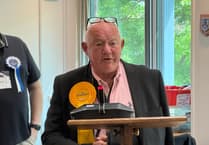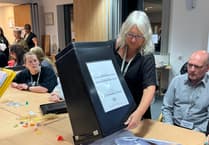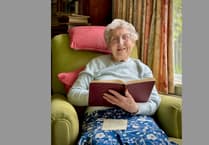DEVON and Cornwall Police force has been fined £234,500 for health and safety breaches in relation to a belt used around the face of former Crediton man, Thomas Orchard, before he collapsed.
Thomas (32), was arrested and taken to Heavitree Road Police Station in Exeter, where he was restrained, in October 2012.
He died in hospital seven days later.
In mitigation, the force said the belt had been used around 500 times about the head on other people and without reports of injury before Mr Orchard’s death.
In a landmark conviction in 2018, the office of the chief constable of Devon and Cornwall Police admitted breaches of the Health and Safety at Work Act.
Following a trial of issue at Bristol Crown Court, a judge ruled he could not be sure the death was caused by the use of the belt, which prevents spitting or biting, and was left on for five minutes and two seconds.
Judge Julian Lambert said the force’s approval of the belt for use about the face followed a "fundamentally flawed process".
He said it was his assessment that it was "only a matter of time" before someone was going to be killed or very seriously injured because of the use of the belt as a spit guard.
The force was also ordered to pay £20,515 in costs.
The court heard the fine was likely to leave the force with fewer officers with the cost of the average recruit being £30,000 per year.
Mr Orchard, who worked as a church caretaker and had paranoid schizophrenia, was restrained and an emergency response belt (ERB) was placed across his face after his arrest in Exeter.
The restraints were removed and he was left in a locked cell for 12 minutes before custody staff re-entered and began resuscitation.
On October 3, 2012, Mr Orchard was arrested in Exeter for shouting at members of the public and taken to Heavitree Road Police station where he was restrained with an ERB after appearing to lunge towards officers. He is transported to the Royal Devon and Exeter Hospital after being resuscitated.
On October 10, 2012 Mr Orchard is declared dead.
On December 18, 2014 a custody sergeant and two detention officers are charged with Mr Orchard’s manslaughter.
All three acquitted after a retrial, after first jury discharged for legal reasons on March 14, 2017.
On February 15, 2018 the police watchdog announces that six Devon and Cornwall Police officers and staff will face misconduct proceedings.
On October 19, 2018 the Office of the Chief Constable of Devon and Cornwall Police pleads guilty to the charge of an offence under the Health and Safety Act.
A three-day trial of issue began on April 15, 2019 at Bristol Crown Court to resolve a series of disputed matters.
On April 18, Judge Julian Lambert rules he cannot be sure that the belt placed around Mr Orchard’s face contributed to his death and on May 3, the judge sentences the force.
POLICE STATEMENT
Following the verdict, Devon and Cornwall Police Chief Constable Shaun Sawyer said: “I am grateful of the approach taken by HHJ Lambert to sentencing Devon and Cornwall Police’s guilty plea to a single charge related to the Health and Safety at Work Act.
“Today’s sentence is clear in its judgement that the actions of Devon and Cornwall Police DID NOT lead to the death of Thomas Orchard.
“The prosecution has suggested a much higher fine than that imposed, namely £1.5 to £6 million – with a starting point of £2.4 million. The Judge has seen fit to balance his judgement to reflect our own views on this, that fine being £234,500.
“My thoughts remain with the family of Thomas Orchard who have suffered immeasurably following Thomas’ death in October 2012. My thoughts are also with colleagues who have had this matter at the forefront of their lives for six-and-a-half years.
“Based upon my own beliefs and the importance of transparency in public life, set alongside my own experiences of the anguish of families seeking answers to questions, the evidence available to me as Chief Constable of Devon and Cornwall Police, I concluded that a plea of guilty to a single health and safety charge was the honest and just response on behalf of the force.
“This has always been a health and safety matter, attention to which was drawn because of the death of Thomas Orchard. Devon and Cornwall Police responded quickly to matters arising as a result and made critical changes from a very early stage in 2012. The court noted there had been no recommendations from the IPOC or HSE, yet nevertheless the force acted proactively in response to this tragedy.
“Devon and Cornwall Police is a very different organisation six-and-half-a-years on from Thomas Orchard’s death in terms of the training delivered to staff, awareness of mental health crisis and our ability to identify and manage violent, vulnerable people coming into police contact.
Chief Constable Sawyer added: “As an organisation we have completely reviewed and radically changed the way in which we deal with those in mental health crisis. I have ensured my organisation has invested hugely in this area and continues to evolve best practice.
“Devon and Cornwall Police was one of the first police forces in the country to roll out and deliver training on Acute Behavioural Disorders in 2017. All new police officers, special constables and custody staff receive this training and also a safety officer briefing.
“Through initiatives like the street triage project and street interaction training, we are much more effective at responding to, recognising and directly addressing vulnerability in our communities.
“We will never be complacent and progress must continue, as should a change in the way in which society in general views mental health and vulnerability.
“Health and safety is a core value within Devon and Cornwall Police and at the heart of so many areas of our business. The court heard the force has had until this point an exemplary health and safety record.”
FAMILY’S FAITH IN POLICE ‘TARNISHED’
During the hearing, Mark Heywood QC for the prosecution read an extract of a victim personal statement by Mr Orchard’s mother Alison. She described the impact of the church caretaker’s death on his family.
“It has been painful to witness how an organisation which had a duty of care for Thomas was so casual, disorganised and sloppy in their approach to health and safety,” she said. “Perhaps the hardest thing to hear was how Thomas’s detention could have and should have been managed.”
She said the family’s faith in Devon and Cornwall Police had been “tarnished” and they had been left “fearful” of how they would be treated by officers.
Jason Beer QC, representing the force, said any fine would have to be funded by a halt in recruitment. Every £100,000 fine would result in a reduction of three recruits for Devon and Cornwall Police, he said.
“It took the occurrence of Mr Orchard’s tragic death to reveal errors in the procurement, risk assessment and training procedures in the force,” Mr Beer told the court. “The use of the device did not, on the evidence, cause actual harm to any person.”
Speaking outside court, Mr Orchard’s father Ken Orchard said the family were leaving court with “no sense of real justice”.
“Investigations over the past six-and-a-half years have highlighted some criminally appalling health and safety practices which desperately needed changing,” he said. “We hope more than anything that the residents of Devon and Cornwall will be at least a little safer today as a result of Thomas’s death.”
‘WONDERFUL’ PERSON
Thomas Orchard was described as a “wonderful human being who was loved dearly” by his family in a statement, released in full on the website of the charity Inquest, which has been supporting the family.
It began: “Everything in our lives is measured as having taken place either before or after Thomas died, such was the trauma of his death. Thomas was a wonderful human being who was loved dearly by his family and we think about him with sadness every day.
“We miss his quirky sense of humour, his oftentimes deep and perceptive comments and his huge presence. We miss witnessing the fulfilment he found in everyday life and his faith; his love of runner beans and cats; crosses and candles.”
Mr Orchard had been making “real progress” and was living semi-independently at the time of his death – with his provisional driving licence arriving in the post the day after he died.
His family said they “grieve doubly” for Mr Orchard because of the hole left but also the future he does not have, such as seeing his brother get married or his nephews grow up.
The family said they were “not confident” that failures had been recognised and genuine changes made, adding they feared other safety issues may remain unidentified.
“From a personal perspective, we are fearful of how we would be treated if we needed to call the police,” they said.
They added that to have some good come of Mr Orchard’s death, such as accountability, changes in policy and a shift in police attitudes towards vulnerable people would “go some way towards our healing”.
ANGER
The Orchard family expressed anger that the force had still not apologised to them.
In the statement, they spoke of the pressure the case had put on them and their distress at how he had sometimes been depicted during the court process.
“It has been hard to hear Thomas defined as an ‘angry man’ when we know he would have been a frightened one; to hear his behaviour described as ‘violent’ at times when we know he was fighting for his life; to hear the effect of his detention compared to that of the capture of a ‘non-human animal’; and to hear that officers thought he was ‘sleeping’ or ‘compliant’ when we know he was probably unconscious or even dead,” they said.
The family’s solicitor, Helen Stone of Hickman and Rose, said: “This case is significant because it has exposed the worryingly haphazard way the UK’s police forces obtain and use the specialist equipment they deploy on Britain’s streets.
“Currently there is no national oversight of the way this equipment is procured, tested and used. Each force is effectively able to make its own decisions – and its own deadly mistakes. This is deeply concerning.”
Deborah Coles, the executive director of the charity Inquest, said: “The sentence should be a wake-up call to the Home Office and all police forces, who are failing to ensure there is systemic consideration of safety when introducing new, varied and potentially unsafe equipment into custody settings.”





Comments
This article has no comments yet. Be the first to leave a comment.